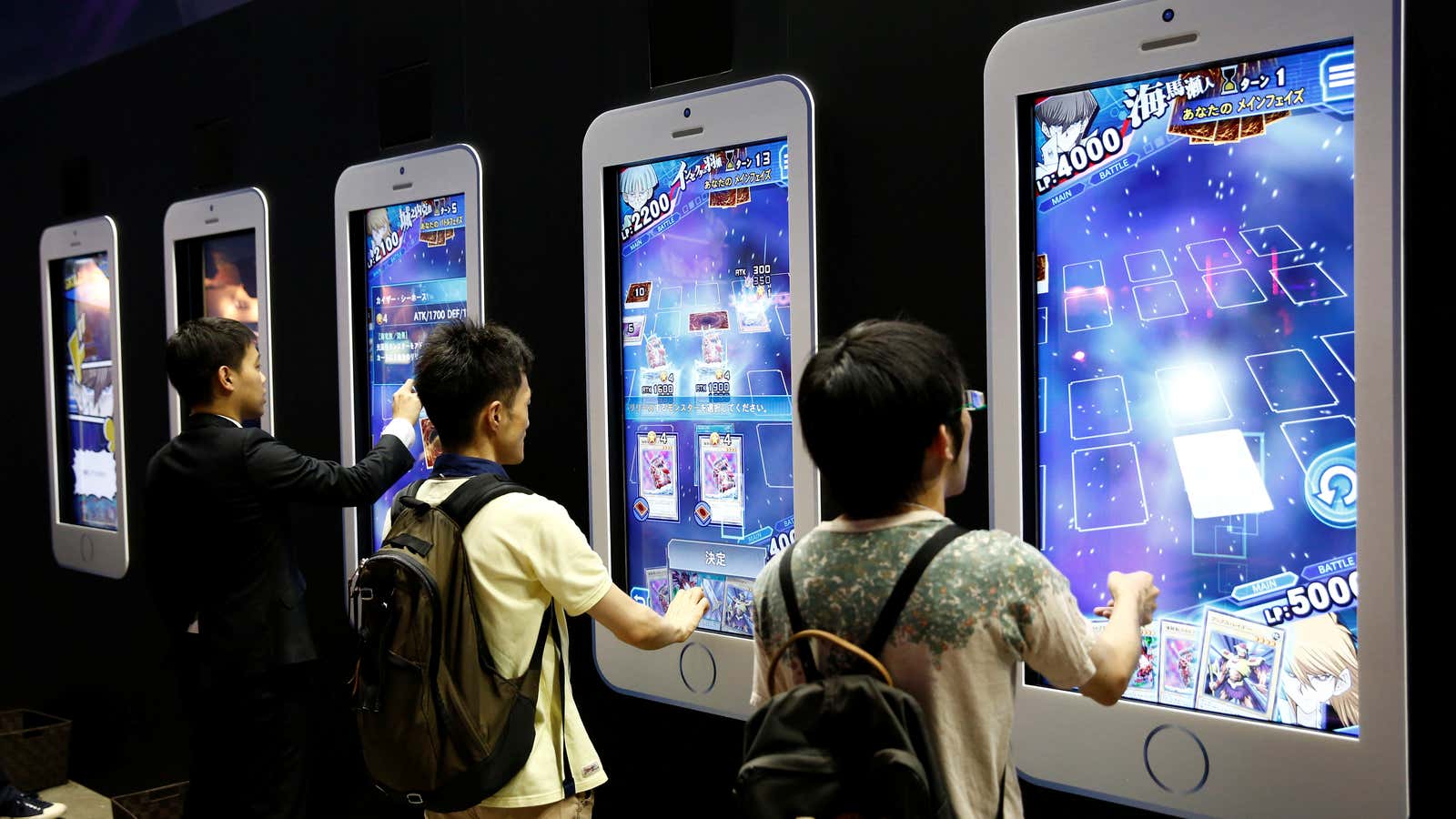This story is part of What Happens Next, our complete guide to understanding the future. Read more predictions about the Future of Gaming.
A dozen years ago—before iPhones, before Twitter, when Facebook was still available only in colleges—the media theorist McKenzie Wark predicted that real life would become infected by the numerical obsession of games. “Games are no longer a pastime, outside or alongside of life,” Wark wrote. “They are now the very form of life, and death, and time, itself.” He called the result “gamespace”—a cultural ideal where all meaning is turned into measurable numbers, against which performance can be judged.
Candy Crush, Fortnite, League of Legends: Today’s most popular games are always driven by numbers. Health numbers, movement numbers, skill numbers, weapon numbers, numbers of coins to buy weapons with bigger numbers, numbers of points to upgrade the movement-and-skill numbers…
Becoming good at games requires developing a comfort with having your actions measured numerically. Those who become particularly adept gain the ability to see through a game’s decorative shroud to the supposedly “real” machinery making it work underneath. But that idea has consequences: Think that way enough, and you might conclude that everything in life has a computable answer.
True to Wark’s prediction, our computer-based numerical obsession is beginning to play out in the offline world. Followers, subscribers and likes measure popularity and worth, pushing some people to buy fake ones. And yet when the fakes get purged, it also feels unfair to have your own influence abridged. Workplaces establish performance metrics for workers; sometimes those metrics can be drawn from social-media or even more invasive surveillance measures. Schools and colleges measure success (and therefore opportunity) through standardized tests, but those tests work in bizarre ways that make the same performance yield different scores in different test sessions. People measure their steps with fitness trackers, their resting heart rates with smartwatches, and how long they sleep with smartphones under their pillows.
Culture believes that these numbers can provide answers. Publications sometimes estimate reading time for articles to offer potential readers a time-to-value ratio of the content. Those fitness trackers and social apps can help you improve your health, but health insurers are also using “lifestyle” data to underwrite coverage. Some folks have even tried to “solve” sexual consent by putting it on the blockchain. In every case, computers are supposed to offer answers, but they often leave us with even more questions.
In a future where technology touches most of our lives, games will remind us that we should not rely entirely on numbers. Games can help people experience the promise of numerical answers—and then also experience the ultimate inadequacy of those answers. In practice, enumeration ends up increasing uncertainty and anxiety rather than reducing it.
The effect is exhausting. An attack with a 90% chance of effect feels like it never works. Does this square on the playfield count as one or two spaces from an enemy? When something is sufficiently quantified, it creates the impression that certainty will follow, but often only uncertainty arrives.
We’re already seeing the results of this effect. Colleges measure success (and therefore opportunity) through standardized tests; those wealthy enough to learn how to perform for these tests are the ones who can realize their greatest potential. Workplaces establish performance metrics for workers, but those yard sticks—deals closed, clicks gained, responses tallied—rarely feel like they actually measure the most important metrics. Some insurance companies have started using wearables and car monitors to assess risk, but the steps one takes or the speed one drives might not be a sufficient assessment of individual circumstances. Social media companies like Facebook and Twitter promise resolution to misinformation by means of artificial intelligence—by throwing more number-crunchers at the problem.
There’s no reason to see this trend slowing down. More data is being collected every day, which means more numbers to subject to analysis. That analysis often takes place unseen in black-box computer systems. New machine-learning algorithms operate by finding their own patterns in data; the human authors of these systems might not ever know exactly how they work. What becomes important is not why or how actions and ideas are turned into numbers, and then into decisions, but the fact that they are perceived to be quantitatively grounded in the first place.
But people are not computers. The ambiguous meaning of human experience is somewhat at odds with the capacities of computers; machines transform things into numbers, whereas humans transform numbers into meaning. Computation promised answers to all our problems—games remind us that that promise is ridiculous.
Games therefore have a shot at becoming the most important medium of the 21st century. They’ll do so not by subsuming and replacing movies or television—media that are thriving more than ever, anyway. Instead, games have a more important role to play today: to help us better understand our tenuous relationship with machines.
This story is part of What Happens Next, our complete guide to understanding the future. Read more predictions about the Future of Gaming.
